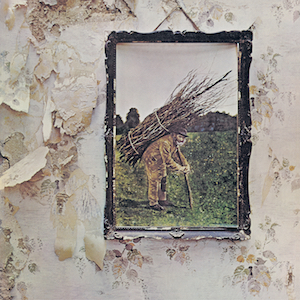
Led Zeppelin IV
The untitled fourth studio album by the English rock band Led Zeppelin, commonly known as Led Zeppelin IV,[a] was released on 8 November 1971 by Atlantic Records. It was produced by guitarist Jimmy Page and recorded between December 1970 and February 1971, mostly in the country house Headley Grange. The album contains the band's most well-known recording, the eight-minute-long "Stairway to Heaven".
"Zoso" redirects here. For the character from the TV series Once Upon a Time, see List of Once Upon a Time characters.Untitled
8 November 1971
- Rolling Stones Mobile at Headley Grange, Headley
- Island Studios, London[1]
- Sunset Sound, Los Angeles[3][4]
42:37
The informal recording environment inspired the band, allowing them to try different arrangements of material and create songs in various styles. After the band's previous album Led Zeppelin III (1970) received lukewarm reviews from critics, they decided their fourth album would officially be untitled and represented instead by four symbols – one chosen by each band member – without featuring the name or any other details on the cover. Unlike the prior two albums, the band was joined by guest musicians: the singer Sandy Denny on "The Battle of Evermore", and the pianist Ian Stewart on "Rock and Roll". As with prior albums, most of the material was written by the band, though there was one cover song, a hard rock re-interpretation of the Memphis Minnie blues song "When the Levee Breaks".
The album was an instant critical and commercial success and is Led Zeppelin's best-selling album, having shipped over 37 million copies worldwide. It is one of the best-selling albums in the US and of all time, while critics have regularly placed it high on lists of the greatest albums of all time.
Songs[edit]
Side one[edit]
"Black Dog" was named after a dog that hung around Headley Grange during recording. The riff was written by Page and Jones, while the a cappella section was influenced by Fleetwood Mac's "Oh Well". The singer Robert Plant wrote the lyrics, and later sang portions of the song during solo concerts.[5] The guitar solos on the outro were recorded directly into the desk, without using an amplifier.[14]
"Rock and Roll" was a collaboration with Stewart that came out of a jam early in the recording sessions at Headley Grange. The drummer John Bonham wrote the introduction, which came from jamming around the intro to Little Richard's "Keep A-Knockin'".[15] The track became a live favourite in concert, being performed as the opening number or an encore.[5] It was released as a promotional single in the US, with stereo and mono mixes on either side of the disc.[16]
"The Battle of Evermore" was written by Page on the mandolin, borrowed from Jones. Plant added lyrics inspired by a book he was reading about the Scottish Independence Wars. The track features a duet between Plant and Fairport Convention's Sandy Denny, [17][b] who provides the only female voice to be heard on a Led Zeppelin recording.[19] Plant played the role of narrator in the song, describing events, while Denny sang the part of the town crier representing the people.[18]
Release[edit]
The album was released by Atlantic on 8 November 1971.[1] It was promoted via a series of teaser advertisements showing the individual symbols on the album artwork.[5] It entered the UK chart at No. 10, rising to No.1 the following week and has spent a total of 90 weeks on the chart.[48] In the US it was Led Zeppelin's best-selling album,[49] but did not top the Billboard album chart, peaking at No. 2 behind There's a Riot Goin' On by Sly and the Family Stone and Music by Carole King.[50][51][c] "Ultimately", writes Lewis, "the fourth Zeppelin album would be the most durable seller in their catalogue and the most impressive critical and commercial success of their career".[5] At one point, it was ranked as one of the top five best-selling albums of all time.[53] The album is one of the best-selling albums of all time with more than 37 million copies sold as of 2014.[54] As of 2021, it is tied for fifth-highest-certified album in the US by the Recording Industry Association of America at 24× Platinum.[55]
The album was reissued several times throughout the 1970s, including a lilac vinyl pressing in 1978, and a box set package in 1988.[56] It was first issued on CD in the 1980s. Page remastered the album in 1990 with engineer George Marino in an attempt to update the catalogue, and several tracks were used for that year's compilation Led Zeppelin Remasters and the Led Zeppelin Boxed Set. All remastered tracks were reissued on The Complete Studio Recordings,[57] while the album was individually reissued on CD in 1994.[58][59]
A remastered version of Led Zeppelin IV was reissued on 27 October 2014, along with Houses of the Holy. The reissue comes in six formats: a standard CD edition, a deluxe two-CD edition, a standard LP version, a deluxe two-LP version, a super deluxe two-CD plus two-LP version with a hardback book, and as high-resolution 24-bit/96k digital downloads. The deluxe and super deluxe editions feature bonus material. The reissue was released with an inverted colour version of the original album's artwork as its bonus disc's cover.[60] The album's remastered version received widespread acclaim from critics, including Rolling Stone, who found Page's remastering "illuminative".[61]